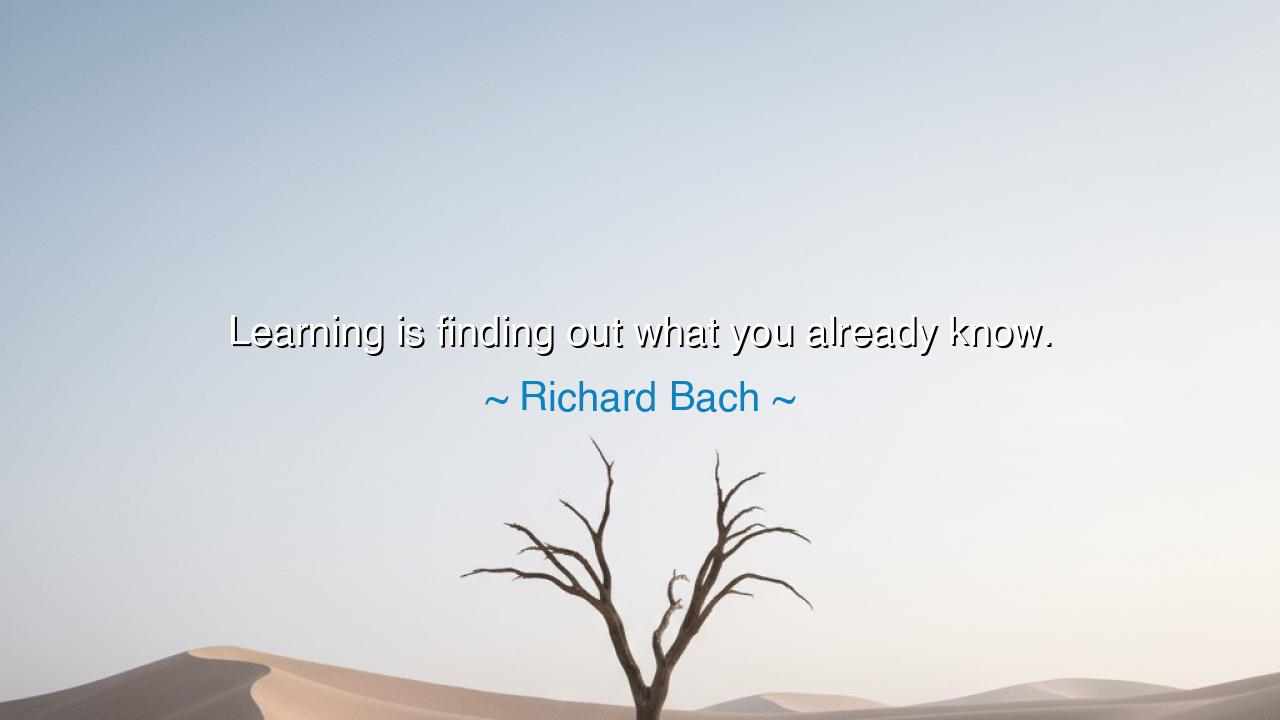
Learning is finding out what you already know.






When Richard Bach wrote, “Learning is finding out what you already know,” he offered a truth as ancient as the human spirit itself — that wisdom is not something poured into us from without, but something awakened from within. These words, deceptively simple, carry the fragrance of timeless philosophy — the idea that within every soul lies a seed of knowledge, waiting to be remembered, not merely taught. Bach, author of Jonathan Livingston Seagull and other works that blend mysticism with human aspiration, spoke as a seeker who understood that true learning is not accumulation, but revelation — the act of rediscovering the truth that has always lived quietly in the depths of our being.
In the language of the ancients, Bach’s insight recalls the teaching of Plato, who declared that all learning is a form of anamnesis — remembering what the soul already knows. Plato believed that the soul, before birth, beheld all truth in the realm of the divine, and that education was not the planting of new knowledge, but the recollection of that eternal vision. Thus, when Bach says that learning is “finding out what you already know,” he stands in a long lineage of thinkers who saw enlightenment not as an external conquest, but an internal awakening. We are not empty vessels to be filled, but luminous beings slowly recalling our own light.
This truth reveals itself in moments of sudden understanding — when something we hear for the first time feels oddly familiar, as though echoing from an older memory. That flash of intuition, that whisper of recognition, is the soul remembering itself. Consider Isaac Newton, who, when the apple fell, did not discover gravity so much as awaken to what had always been present — the law written into the fabric of existence and mirrored in the quiet knowing of his own mind. Newton’s revelation was not the creation of truth, but its uncovering. As Bach might say, he found out what humanity already knew but had forgotten to see.
There is profound humility in this teaching. For if learning is remembrance, then the teacher is not a master who gives knowledge, but a guide who helps the student to see what was already within. The wise do not dictate truth; they draw it forth. The ancient philosopher Socrates understood this, calling himself a midwife of the soul. His method was not to lecture but to question, helping others to give birth to their own understanding. In this light, Bach’s words are not just poetic, but practical — they call upon us to trust our inner wisdom, to seek teachers who awaken rather than impose, and to remember that knowledge begins with self-recognition.
Yet this insight carries a challenge as well: if truth is within us, then we are responsible for seeking it. Many live their lives in forgetfulness, distracted by noise and illusion, mistaking information for wisdom. To “find out what you already know” requires stillness — the courage to turn inward and listen. It demands reflection, meditation, and the humility to accept that the answers we seek often lie beneath layers of fear, habit, and doubt. The path of learning, then, is the path of self-discovery, of stripping away falsehood until what remains is the shining simplicity of truth.
History offers us a moving example in Buddha’s enlightenment beneath the Bodhi tree. After years of study, asceticism, and striving, he realized that what he sought was not to be found in scriptures or teachers, but within his own awakened awareness. When he finally understood this, he became the Buddha — the “awakened one.” His journey mirrors Bach’s wisdom: that learning is not an external pursuit of facts, but an inward awakening to what the heart has always known. The same divine insight glows in every being; we need only open the inner eye to see it.
The lesson, then, is clear and eternal: trust the wisdom within. Do not mistake learning for the memorization of others’ thoughts. True education is not about gathering, but about awakening. When you read, reflect. When you study, listen to the echo it stirs in your heart. When a truth moves you, it does so because it belongs to you already. Every discovery is a homecoming — the soul recognizing its own voice in the vast chorus of creation.
So remember, as Richard Bach reminds us: learning is not the discovery of new lands, but the rediscovery of yourself. The truths you seek are not foreign; they are the hidden treasures buried in your own depths. Seek them through thought, through silence, through wonder. For the greatest journey of all is not outward into the world, but inward into the timeless knowing that has been with you from the beginning — the radiant light of truth waiting patiently to be found again.






AAdministratorAdministrator
Welcome, honored guests. Please leave a comment, we will respond soon